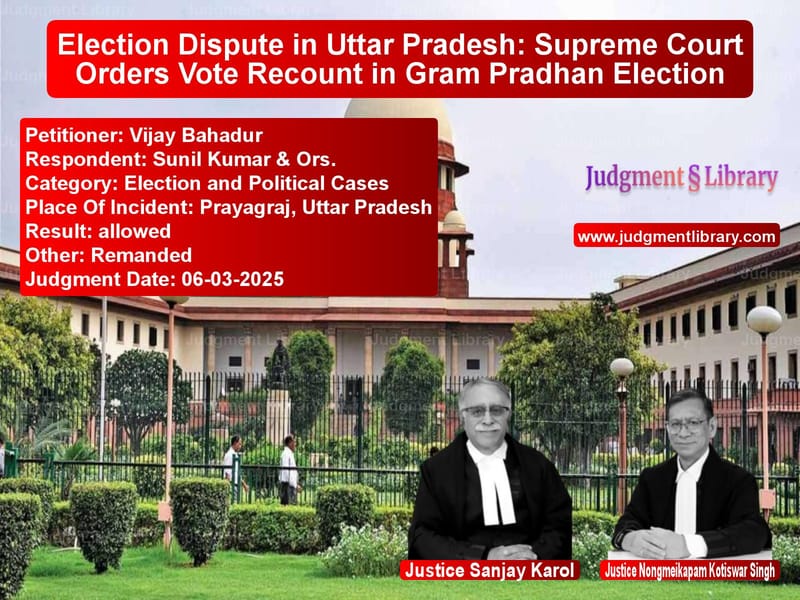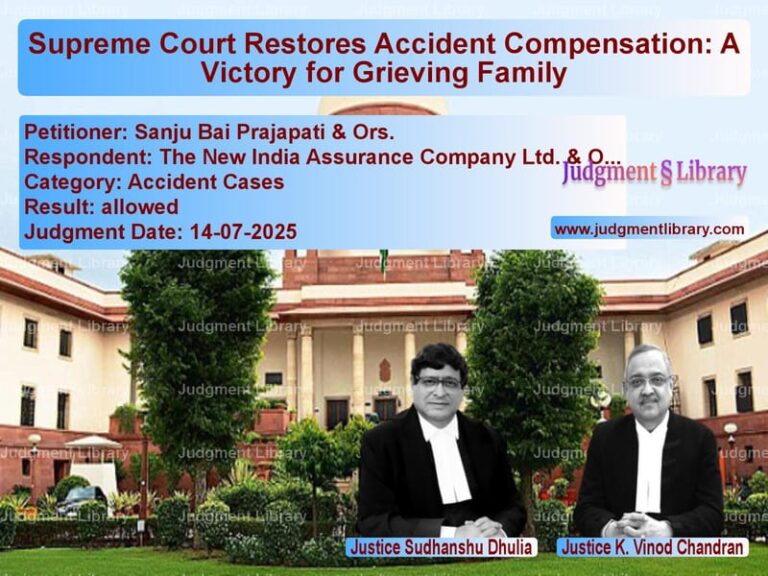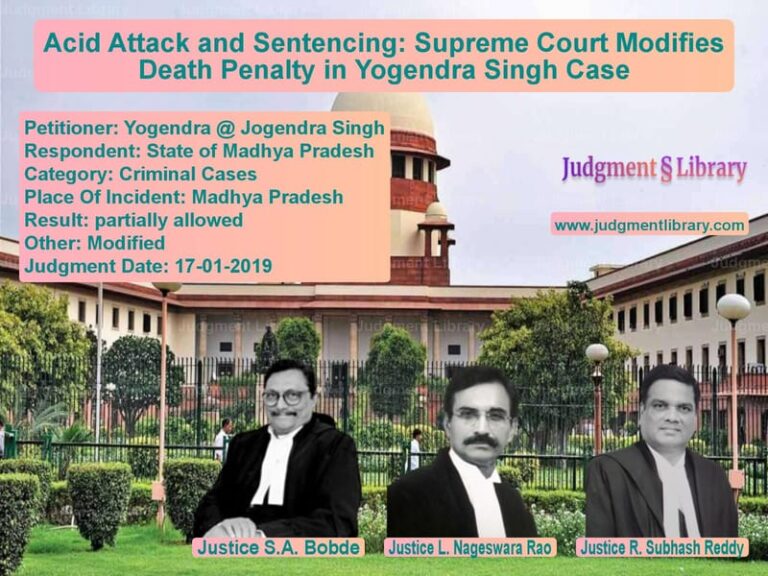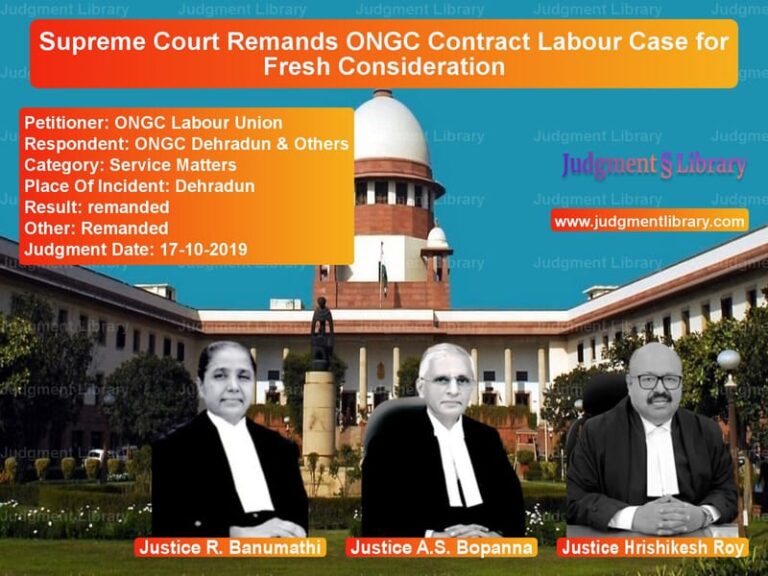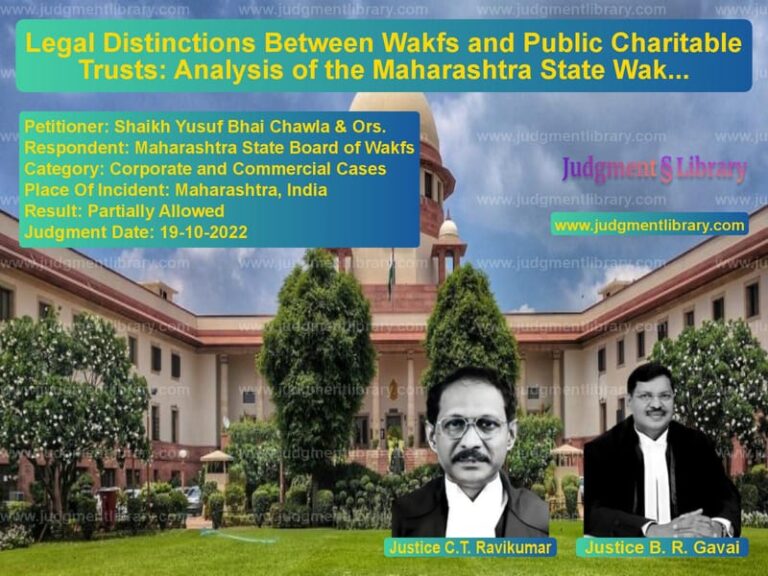Election Dispute in Uttar Pradesh: Supreme Court Orders Vote Recount in Gram Pradhan Election
The Supreme Court of India has delivered a significant judgment in Vijay Bahadur v. Sunil Kumar & Ors., addressing a dispute arising from the Gram Pradhan elections in Uttar Pradesh. The case highlights the importance of fair electoral processes and the integrity of vote counting, emphasizing that any discrepancies in election results must be thoroughly scrutinized to uphold democracy.
Background of the Case
The dispute arose from the election for the position of Gram Pradhan in the village of Chaka @ Chak, Saidabad, Tehsil Handia, District Prayagraj, Uttar Pradesh. The election was conducted on May 2 and 3, 2021, and Sunil Kumar was declared the winner. However, the appellant, Vijay Bahadur, contested the election result, citing inconsistencies in the vote count at three polling booths.
Key Discrepancies Alleged by the Appellant
- The Presiding Officer informed the appellant that 1,194 votes were cast in polling booths 43, 44, and 45. However, the final election tally (Form 46) recorded 1,213 votes, indicating a discrepancy of 19 additional votes.
- The appellant alleged that these additional votes were unlawfully introduced to favor the winning candidate.
- He also contended that 51 ballots were arbitrarily invalidated, negatively affecting his final count.
- His repeated requests for a recount were denied by election authorities.
Legal Proceedings and Findings
Election Petition Before the Sub-Divisional Magistrate
The appellant filed an election petition under Section 12-C of the Uttar Pradesh Panchayat Raj Act, 1947, seeking a recount of votes. The Sub-Divisional Magistrate (SDM) found merit in the allegations and passed an order on October 31, 2022, directing a recount of votes in booths 43, 44, and 45.
High Court Ruling
Aggrieved by the SDM’s order, Sunil Kumar filed a writ petition before the Allahabad High Court. The High Court set aside the recount order, citing the following reasons:
- The appellant failed to produce substantial documentary evidence supporting his claims.
- The secrecy of the ballot should not be compromised based on unsubstantiated allegations.
- The affidavits submitted by election officials and other candidates indicated no irregularities in the counting process.
Supreme Court’s Analysis and Judgment
Key Observations by the Court
The Supreme Court emphasized the fundamental importance of electoral integrity and transparency. The Court noted:
“Each vote has its own value irrespective of its effect in the final outcome of the election. Its sanctity has to be protected.”
Examining the records, the Court found multiple irregularities in the election process:
- The Presiding Officer’s diary, which records the number of votes cast, was missing and could not be located.
- The discrepancy of 19 additional votes was unexplained.
- Three out of four contesting candidates supported the request for a recount, questioning the accuracy of the declared results.
- The use of police force to remove the appellant from the polling station area indicated possible misconduct.
Legal Precedents Considered
The Court referred to several past judgments to establish when a recount is warranted:
- Ram Sewak Yadav v. Hussain Kamil Kidwai (1964): Inspection of ballot papers is justified only when a prima facie case of irregularity is established.
- Vadivelu v. Sundaram (2000): A recount should only be ordered if the petitioner proves substantial irregularities in counting.
- Bhabhi v. Sheo Govind (1976): Recount is permissible when improper rejection or acceptance of votes materially affects the election outcome.
Final Verdict
Based on the evidence and legal precedents, the Supreme Court ruled:
“The judgment of the High Court is set aside. The order of the Sub-Divisional Magistrate directing a recount is restored.”
The Court directed the Registrar General of the Allahabad High Court to communicate this judgment to the concerned Magistrate to proceed with the recount.
Key Takeaways from the Judgment
- Election fairness is paramount: Any discrepancies in vote counts must be thoroughly examined.
- Secrecy of the ballot is protected but not absolute: When serious irregularities arise, recounting is justified.
- Recount orders require strong justification: The burden of proof lies on the petitioner, but missing documents and unexplained discrepancies strengthen their case.
- Electoral integrity requires accountability: Election officers must ensure accurate vote counting and maintain proper records.
Conclusion
The Supreme Court’s ruling in this case reinforces the principles of democracy, fairness, and transparency in electoral processes. By ordering a recount, the Court has upheld the importance of verifying election results when serious concerns are raised. This judgment will serve as a guiding precedent in future election disputes, ensuring that the sanctity of the voting process remains protected.
Read also: https://judgmentlibrary.com/supreme-court-reinstates-sarpanch-wrongfully-removed-by-bureaucracy/
Petitioner Name: Vijay Bahadur.Respondent Name: Sunil Kumar & Ors..Judgment By: Justice Sanjay Karol, Justice Nongmeikapam Kotiswar Singh.Place Of Incident: Prayagraj, Uttar Pradesh.Judgment Date: 06-03-2025.
Don’t miss out on the full details! Download the complete judgment in PDF format below and gain valuable insights instantly!
Download Judgment: vijay-bahadur-vs-sunil-kumar-&-ors.-supreme-court-of-india-judgment-dated-06-03-2025.pdf
Directly Download Judgment: Directly download this Judgment
See all petitions in Public Interest Litigation
See all petitions in Legislative Powers
See all petitions in Judgment by Sanjay Karol
See all petitions in Judgment by N. Kotiswar Singh
See all petitions in allowed
See all petitions in Remanded
See all petitions in supreme court of India judgments March 2025
See all petitions in 2025 judgments
See all posts in Election and Political Cases Category
See all allowed petitions in Election and Political Cases Category
See all Dismissed petitions in Election and Political Cases Category
See all partially allowed petitions in Election and Political Cases Category

